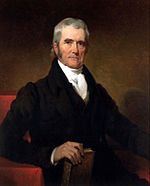No subscription or hidden extras
Read through the most famous quotes from John Marshall
Marshall's early education was superintended by his father who gave him an early taste for history and poetry. In that case the Supreme Court invalidated a provision of the Judiciary Act of 1789 on the grounds that it violated the Constitution by attempting to expand the original jurisdiction of the Supreme Court. Daniel Webster argued that the Constitution by empowering Congress to regulate interstate commerce implied that states do not have any concurrent power to regulate interstate commerce.
Nevertheless Marshall built up the third branch of the federal government and augmented federal power in the name of the Constitution and the rule of law. Marshall along with Daniel Webster (who argued some of the cases) was the leading Federalist of the day pursuing Federalist Party approaches to build a stronger federal government over the opposition of the Jeffersonian Republicans who wanted stronger state governments. Furthermore Marshall's court made several important decisions relating to federalism affecting the balance of power between the federal government and the states during the early years of the republic.

